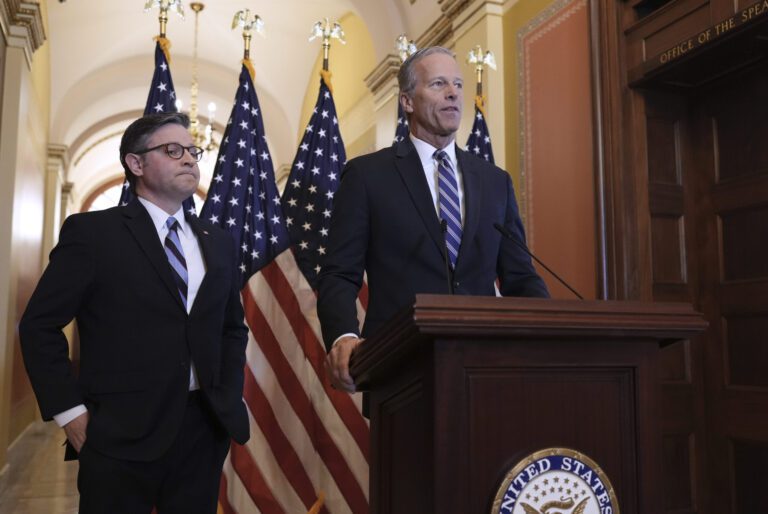High-Stakes Meeting Ahead: Congress and Trump Aim to Avoid Government Shutdown
As the clock ticks down to a potential government shutdown, Congressional leaders are solidifying their positions ahead of a crucial meeting with President Trump at the White House on Monday. The deadline looms large, with the government set to close by the end of the day on Tuesday unless a deal is reached.
The Impasse: Key Sticking Points
In recent weeks, Republicans have asserted that they will not engage in discussions about policy modifications, particularly concerning extended health insurance subsidies, even as the deadline draws nearer. On September 19, Senate Democrats voted overwhelmingly—with only one dissenting voice—to obstruct a continuing resolution aimed at keeping the government funded until November 21. Notably, advancing any spending bill requires a total of 60 votes in the Senate.
Republican Stance
-
Senator John Thune, the Majority Leader, emphasized on NBC’s “Meet the Press” that the fate of a government shutdown is "totally up to the Democrats." He stated:
"The ball is in their court. There is a bill sitting at the desk in the Senate right now—we could pick it up and pass it today."
- When questioned about making compromises with Democrats, Thune downplayed the need for negotiation:
"This is a simple, seven-week funding resolution… something that Democrat senators have said they want to see done."
Democratic Concerns
Conversely, Senator Chuck Schumer, the Minority Leader, has been facing pressure from the Democratic base after a contentious vote in March where he supported advancing a government funding deal. Schumer warns that failure to address health insurance subsidies could lead to higher costs for Americans as the open enrollment period begins in November:
"We need a serious negotiation… Are they serious about negotiating with us in a real way?"
The Stakes: Health Insurance and Funding
-
Democrats are advocating for the immediate revisitation of enhanced Affordable Care Act subsidies, arguing that delays could further burden American households. The current Republican-backed proposal postpones the next round of funding negotiations until mid-November, which raises concerns about skyrocketing health insurance costs.
- Schumer adds, "They’re trying to intimidate the American people and us," highlighting the political ramifications of the potential shutdown.
Potential Consequences and Political Dynamics
If Senate Democrats succeed in negotiating concessions from the Republican majority, Speaker Mike Johnson may need to convene the House for an emergency vote on a new spending proposal, as the House is not scheduled to return until October 1—the same day a government shutdown would commence if no deal is in place.
Challenges for Speaker Johnson
Speaker Johnson will likely face pushback from his party’s conservative wing, particularly when it comes to the extension of Affordable Care Act subsidies.
- Johnson articulated the intent of the Monday meeting:
"He [Trump] wants to operate in good faith… to follow common sense and do what’s right by the American people."
Diverging Views Among Republicans
Even among more centrist Republican senators, there is skepticism regarding extensions of COVID-era funding increases for health insurance. Senator James Lankford remarked:
"This was a [reform] that was done for COVID. We’re not in a COVID emergency anymore."
Conclusion: A Critical Meeting Ahead
As Congress and President Trump prepare for a high-stakes meeting, the outcome remains uncertain. With both parties firmly entrenched in their positions, the question of whether a compromise can be reached looms large. Failure to find common ground could have extensive implications not only for federal funding but also for everyday Americans reliant on health care coverage.
For ongoing updates and further insights on this developing situation, visit Congress.gov and Healthcare.gov.


